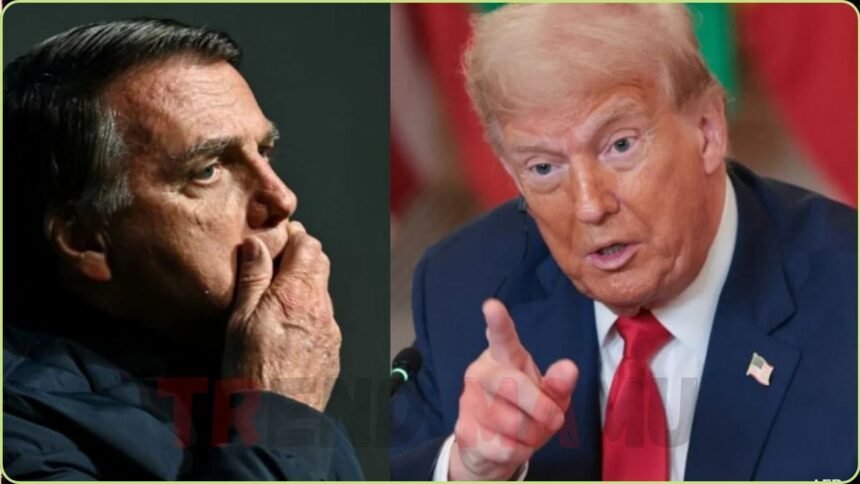Trump Tariff Threat on Brazil: A Risky Move for Bolsonaro?. In a bold and controversial move, U.S. President Donald Trump announced on July 9, 2025, that he plans to impose a staggering 50% tariff on all Brazilian imports starting August 1, 2025.
This decision, outlined in a letter to Brazilian President Luiz Inácio Lula da Silva, has sent shockwaves through U.S.-Brazil relations, marking a low point in their diplomatic ties.
Trump’s primary grievance is Brazil’s prosecution of former President Jair Bolsonaro, which he calls a “witch hunt,” alongside accusations of Brazil attacking U.S. tech companies and free speech.
But why is Trump targeting Brazil, and could this aggressive stance backfire for his ally Bolsonaro? This article explores the reasons behind Trump’s tariff threat, its potential economic and political fallout, and whether it will bolster or harm Bolsonaro’s standing in Brazil.
Why Trump Is Targeting Brazil
Trump’s tariff threat is deeply tied to his personal and political loyalty to Jair Bolsonaro, often dubbed the “Trump of the Tropics.” The two leaders share a history of mutual admiration, having met at the White House in 2019 and Mar-a-Lago in 2020.
Both have faced legal scrutiny for actions following election losses—Trump for the January 6, 2021, U.S. Capitol riot and Bolsonaro for an alleged coup attempt after his 2022 election defeat to Lula.
Trump has drawn parallels between their legal battles, calling Bolsonaro’s trial a “witch hunt” and an “international disgrace” in his letter to Lula.
He argues that Brazil’s Supreme Court is unfairly targeting Bolsonaro, who faces charges for allegedly plotting to overturn the 2022 election results, including plans to assassinate Lula and attack a Supreme Court justice.
Beyond defending Bolsonaro, Trump accuses Brazil of attacking U.S. interests, particularly through its Supreme Court’s rulings on social media. Brazil has ordered the removal of accounts spreading disinformation, many linked to Bolsonaro’s supporters, and temporarily banned Elon Musk’s X platform for refusing to comply.
Trump’s company, Trump Media, which operates Truth Social, is also fighting Brazilian court orders, prompting Trump to claim Brazil is violating “the fundamental Free Speech Rights of Americans.” Additionally, he alleges unfair trade practices, despite the U.S. enjoying a trade surplus with Brazil, exporting $49 billion in goods compared to $42 billion in imports in 2023.
Trump’s tariffs appear to be a strategic use of economic leverage to pressure Brazil into dropping Bolsonaro’s prosecution and easing restrictions on U.S. tech firms.
This move aligns with his broader tariff strategy, which he claims boosts U.S. manufacturing but often serves political ends, as seen in his threats against BRICS nations for their “anti-American” stance.
Economic Stakes: A Blow to Brazil’s Economy
The proposed 50% tariff could have severe consequences for Brazil, Latin America’s largest economy and the U.S.’s second-largest trading partner after China. Key Brazilian exports like coffee, oranges, and beef—sectors tied to Bolsonaro’s agribusiness base—face significant risks.
The Brazilian real dropped over 2% against the dollar after Trump’s announcement, and companies like Embraer and Petrobras saw stock market setbacks.
Lula’s government has vowed to retaliate with reciprocal tariffs under Brazil’s economic reciprocity law, but analysts question whether Brazil can match the U.S.’s economic clout in a trade war.
Unlike other countries targeted by Trump’s tariffs, Brazil’s trade surplus with the U.S. undermines his argument of correcting trade imbalances. This suggests the tariffs are more about political signaling than economic fairness.
Brazilian businesses are scrambling to assess the impact, particularly on agribusiness, which could face higher costs and reduced U.S. market access. A trade war could raise food prices in the U.S., where Brazil supplies a third of consumed coffee, while hurting Brazilian exporters.
Political Fallout: A Boost or Backfire for Bolsonaro?
Trump’s tariff threat is a clear show of support for Bolsonaro, who remains a polarizing figure in Brazil. His supporters, including São Paulo Governor Tarcísio de Freitas, have capitalized on the move, blaming Lula’s policies for provoking Trump.
Bolsonaro’s son Eduardo, a frequent visitor to Trump’s Mar-a-Lago, has been lobbying for U.S. support, framing his father’s trial as political persecution.
Trump’s letter, calling Bolsonaro a “Highly Respected Leader,” gives his base a powerful endorsement, potentially strengthening his influence despite being banned from running for office until 2030.
However, this move could backfire. Bolsonaro’s political base, particularly in agribusiness, relies heavily on exports to the U.S. Tariffs could hit these sectors hard, alienating his supporters if economic hardship follows.
A May 2025 poll showed 55% of Brazilians disapprove of Trump, and his intervention may be seen as an attack on Brazil’s sovereignty, rallying even Lula’s critics around a nationalist cause.
Centrist senator Alessandro Vieira called Trump’s actions “foreign aggression,” signaling broad disapproval. Analysts like Oliver Stuenkel suggest this could create a “rally-around-the-flag” effect, boosting Lula’s struggling popularity by framing him as a defender of Brazilian independence.
Lula’s Defiant Response and Brazil’s Sovereignty
President Lula has firmly rejected Trump’s demands, emphasizing Brazil’s sovereignty and judicial independence. In a post on X, he stated, “Brazil is a sovereign nation with independent institutions and will not accept any form of tutelage.”
He defended the Supreme Court’s actions, arguing that freedom of expression does not cover “aggression or violent practices.” Lula’s team held an emergency meeting to address the tariffs, signaling a readiness to retaliate, though the specifics remain unclear.
This stance has resonated with Brazilians wary of foreign interference, potentially strengthening Lula’s position ahead of the 2026 election.
Could It Backfire for Bolsonaro?
Trump’s tariffs may initially energize Bolsonaro’s base, but the economic fallout could undermine his long-term prospects. If tariffs hurt Brazil’s economy, particularly in agribusiness, Bolsonaro’s supporters may blame him for drawing Trump’s ire.
Social media memes mocking Bolsonaro-backed candidates, like Tarcísio wearing a MAGA hat, reflect growing public frustration. With Bolsonaro ineligible to run in 2026, his movement faces uncertainty, and Trump’s intervention could alienate moderate voters who prioritize economic stability over political loyalty. The Canadian election, where a Trump-like candidate lost to a centrist opposing U.S. influence, serves as a cautionary tale.
A High-Stakes Gamble
Trump’s 50% tariff threat against Brazil is a risky play driven by loyalty to Bolsonaro and frustration with Brazil’s judicial and tech policies. While it may bolster Bolsonaro’s image among his base, it risks alienating his supporters in key economic sectors and galvanizing opposition to Lula.
For Brazil, the tariffs threaten economic pain, but Lula’s defiant response could turn the crisis into a political opportunity. As the 2026 election looms, Trump’s move has set the stage for a turbulent chapter in U.S.-Brazil relations, with Bolsonaro’s future hanging in the balance.








